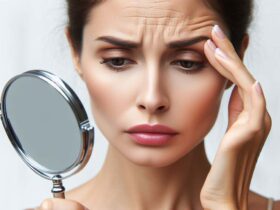As an experienced physician, I have seen firsthand the challenges that menopausal and thyroid disease can bring to your skin. Fluctuating hormone levels can cause a range of skin issues including dryness, itchiness, acne, and thinning of the skin. It’s important to address these issues with the right natural remedies to effectively manage them. In this blog post, I will share with you the best natural remedies that can help alleviate the symptoms of menopausal and thyroid disease skin issues, so you can feel confident and comfortable in your own skin again.
Key Takeaways:
- Regular exercise: Exercise can help improve blood circulation and reduce stress, which may alleviate symptoms of menopausal and thyroid disease skin issues.
- Healthy diet: Eating a balanced diet that includes plenty of fruits, vegetables, and whole grains can provide necessary nutrients for skin health and overall well-being.
- Natural skincare products: Using gentle, natural skincare products can help manage skin issues associated with menopause and thyroid disease without aggravating sensitive skin.
Understanding Skin Issues during Menopause
Some women experience a variety of skin issues during menopause due to fluctuating hormone levels. These changes can cause a range of symptoms from dryness and irritation to acne and thinning skin. Understanding how menopause affects the skin can help you manage these issues more effectively.
Common Menopausal Skin Problems
During menopause, many women may notice their skin becoming drier and less elastic. This can lead to itching, flaking, and an increased risk of developing wrinkles. Some women also experience an increase in acne or rosacea, while others may notice thinning of the skin, making it more prone to bruising and tearing.
How Hormonal Changes Affect Skin
As hormone levels fluctuate during menopause, the body produces less collagen and elastin, which are essential for maintaining skin elasticity and hydration. This can result in dry, itchy skin and an increased risk of developing fine lines and wrinkles. Additionally, decreased estrogen levels can lead to a decrease in sebum production, causing the skin to become drier and more prone to irritation.
Obviously, managing skin issues caused by thyroid disease requires a thorough understanding of the impact thyroid conditions can have on the skin. As someone with expertise in managing menopausal and thyroid disease skin issues, I can provide valuable insights into the specific concerns related to thyroid disease and offer effective natural remedies for addressing them.
Hypothyroidism and Hyperthyroidism Effects on Skin
Hypothyroidism and hyperthyroidism can both have significant effects on the skin. Hypothyroidism can cause dry, flaky skin, as well as brittle nails and hair loss. On the other hand, hyperthyroidism can lead to excessive sweating, thinning skin, and a moist, warm complexion. Both conditions can also result in changes in skin texture and pigmentation, making it essential to address these concerns as part of managing thyroid-related skin issues.
Strategies for Managing Thyroid-Related Skin Issues
When it comes to managing thyroid-related skin issues, taking a holistic approach is crucial. In my experience, addressing the underlying thyroid condition is the first step in improving skin health. This may involve working with your healthcare provider to regulate thyroid hormone levels through medication or other treatments. Additionally, incorporating natural remedies such as a healthy diet, adequate hydration, and specific skincare practices can help support your skin’s health while managing thyroid disease.
Natural Remedies for Menopausal Skin Issues
However, dealing with skin issues during menopause can be challenging. Fluctuating hormone levels, especially the decrease in estrogen, can lead to dryness, thinning, and sagging of the skin. Additionally, menopause can also cause an increase in skin sensitivity and a higher likelihood of developing various skin conditions.
Herbal Supplements and Their Benefits
When it comes to managing menopausal skin issues, incorporating herbal supplements into your daily routine can be beneficial. Some herbs, such as black cohosh and red clover, have phytoestrogenic properties that mimic the effects of estrogen in the body, helping to alleviate dryness and improve skin elasticity. Additionally, herbs like ginseng and dong quai have anti-inflammatory properties that can help reduce skin redness and irritation. It’s important to consult with a healthcare professional before adding any herbal supplements to your regimen to ensure they are safe and appropriate for you.
Lifestyle Adjustments for Improved Skin Health
Making certain lifestyle adjustments can also help improve the overall health and appearance of menopausal skin. Ensuring that you stay properly hydrated is essential for maintaining skin elasticity and preventing dryness. Consuming a diet rich in antioxidants, such as fruits and vegetables, can also help protect the skin from oxidative stress and promote a youthful appearance. Incorporating regular exercise into your routine can help improve blood circulation, delivering essential nutrients to the skin and promoting a healthy complexion. And most importantly, remember to protect your skin from the sun by using a broad-spectrum sunscreen with a high SPF to prevent further damage and premature aging.
Natural Approaches to Thyroid Disease-Induced Skin Problems
Your thyroid plays a crucial role in regulating your metabolism and maintaining the health of your skin. When your thyroid is not functioning optimally, it can lead to skin issues such as dryness, itchiness, and hair loss. While conventional treatments can help manage thyroid disease, there are also natural remedies that can complement your treatment plan and provide relief for skin problems associated with thyroid disease.
Diet and Nutrition for Healthy Skin
Proper nutrition is essential for maintaining healthy skin, especially for individuals with thyroid disease. A diet rich in antioxidants, vitamins, and minerals can help support your skin’s health and improve its appearance. Foods such as fruits, vegetables, nuts, and fatty fish are excellent sources of essential nutrients that can benefit your skin. Additionally, limiting your intake of processed foods, sugary snacks, and caffeine can help reduce inflammation and support your overall skin health.
Essential Oils and Topical Treatments
Using essential oils and topical treatments can provide relief for skin issues caused by thyroid disease. Essential oils such as lavender, tea tree, and chamomile have anti-inflammatory and soothing properties that can help alleviate dryness and irritation. When used in combination with carrier oils, such as coconut or jojoba oil, they can be applied topically to the skin to promote moisture and reduce itchiness. Additionally, topical treatments containing ingredients like shea butter, aloe vera, and vitamin E can help nourish and hydrate the skin, providing relief from dryness and discomfort.
Conclusion: The Best Natural Remedies for Managing Menopausal and Thyroid Disease Skin Issues
With these considerations, I have found that natural remedies such as coconut oil, aloe vera, and vitamin E can be effective in managing the skin issues associated with menopause and thyroid disease. These remedies provide hydration, reduce inflammation, and promote healing, making them valuable additions to your skincare routine. In addition, maintaining a healthy diet and lifestyle can also contribute to overall skin health. It’s important to consult with a healthcare professional to determine the best course of action for your specific condition, but incorporating natural remedies can be a beneficial aspect of managing your skin issues.
Source link: https://kimblebeauty.com/what-are-the-best-natural-remedies-for-managing-menopausal-and-thyroid-disease-skin-issues/ by Larrian28 at kimblebeauty.com






